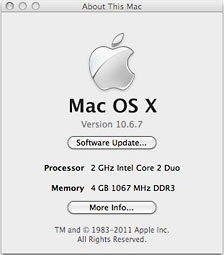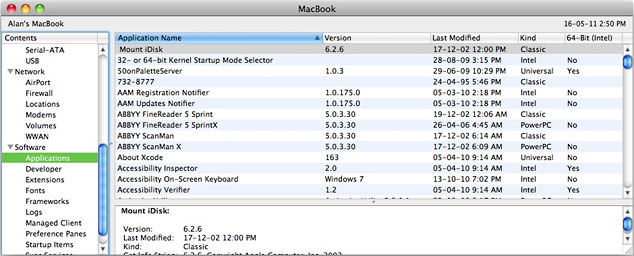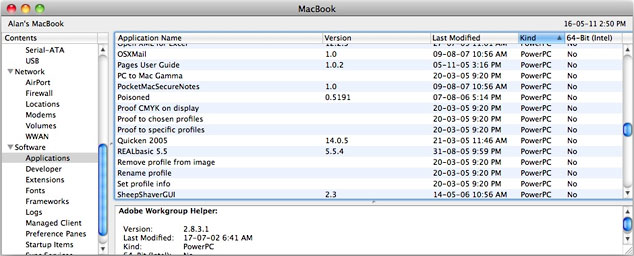While waiting for Lion, the upcoming 10.7 release of Apple's
OS X, word has spread that - at least in the Developer's Preview
Releases making the rounds - there is no support for Rosetta.
Rosetta, offered by Apple to accompany its first Intel-powered Macs,
allows those models to run OS X software compiled for use on its
older PowerPC (PPC) Macs - in other words, any Mac released prior to
2006. Much of the software created after that date was compiled for
both PPC and Intel Macs; more recently, software is being compiled that
will only run on Intel models.
If Apple follows through with not including Rosetta in the release
version of Lion, this won't be a big surprise; in Snow Leopard (Mac OS X 10.6), the
first version of OS X to only run on Intel Macs, Rosetta wasn't
installed by default, though the first time a user attempted to run an
application that required it, a dialogue box popped up offering to
download it. (There is an option for installing Rosetta buried deep in
the Snow Leopard installer's options).
 Depending on
the software you have on your Mac, a lack of Rosetta will be more or
less of an issue. But how to know what's installed that needs it?
Depending on
the software you have on your Mac, a lack of Rosetta will be more or
less of an issue. But how to know what's installed that needs it?
Here's how to tell.
- Open the System Profiler, either by looking in your
/Applications/Utilities folder or by clicking the Apple menu, choosing
About This Mac, and then clicking the More info...
button
- In System Profiler, scroll down the Contents list on the left until
you see Software. If needed, click the flippy triangle to show the
various subsections under Software; click on Applications and be
prepared to wait for several minutes while System Profiler polls your
system's software.
- Eventually, you'll see a list of installed programs, with
information about each. By default, the list is in alphabetical order
by application name. You may want to click on the word Kind
along the top, relisting them by how they were compiled.

Here are the various 'kinds' of applications:
- Classic: these were compiled to run under OS 9 or older Mac
'classic' operating system versions. If you have an Intel Mac, they
don't run, since those Macs lack any ability to run classic programs.
(I'm surprised to see that I still have several of these listed on my
MacBook!)
- Intel: these have been compiled to only run on the newer Intel
Macs.
- PowerPC: as the name suggests, these are the ones that were
compiled for older, PowerPC Macs - and are the ones that require
Rosetta to run on newer Intel Macs - in other words, if Rosetta is not
included with Lion, you may need to start looking for alternatives
- Universal: these were compiled to run on both PPC and Intel Macs,
no Rosetta required.

On my Late 2008
Aluminum MacBook, I have quite a few applications that are listed
as requiring Rosetta. Many of them are things I probably won't
miss:
- AppleWorks 6. I don't know when I last used this, though some of
you may still be AppleWorks users
- DropStuff, DropTar, Stuffit Expander, and other formerly popular
archiving/unarchiving utilities
- Epson scanner utilities from an all-in-one that is no longer in use
with my system
- Internet Explorer
- Klondike Forever solitaire
- Nvu webpage editor, replaced with the newer KompoZer*
Some, though, I use regularly. Among them:
- An older version of GraphicConverter. I guess it's time I upgraded
this classic shareware graphics utility.
- MacTheRipper. Is there a replacement for this freebie DVD
ripper?
- Quicken 2005. This came bundled with a PPC iMac, and I've used it
ever since. In order to migrate my financial data, I'm going to have to
convert it to Quicken 2007 format, and then convert that to the current
format. Sigh.
Some I may not use regularly but I'll miss:
- SheepShaver: a
virtual classic Mac environment that I've written about on Low End Mac;
the actual SheepShaver virtual environment may continue to work, but
the SheepShaver GUI utility, for easier management of settings, is a
PPC application. Maybe the developer will create an updated version.
(Or maybe he already has!)
In any event, if you're running an Intel Mac and if you have a mix
of older and newer software, take a few moments and see for yourself,
so you can start planning in case Lion drops support for any PPC-era
software that's installed on your system.

* Editor's note: There's a new app in town, BlueGriffon, which is a promising
replacement for Nvu and KompoZer.

 Depending on
the software you have on your Mac, a lack of Rosetta will be more or
less of an issue. But how to know what's installed that needs it?
Depending on
the software you have on your Mac, a lack of Rosetta will be more or
less of an issue. But how to know what's installed that needs it?


